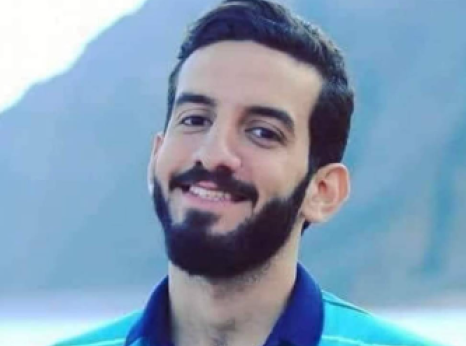Egypt: Abused Egyptian Activist Unjustly Detained

Moaz al-Sharqawy is an Egyptian activist and former Vice-President of the Students’ Union at Tanta University in Tanta, Garbiya governorate, whose work focused on defending students’ rights to freedom of expression and peaceful assembly inside universities, campaigning on behalf of unjustly jailed students, and calling for accountability for students unlawfully killed by security forced during protests.
According to informed sources, Moaz Al-Sharqawy was first arrested in September 2019 and subjected to enforced disappearance for 24 days by the National Security Agency (NSA), during which period he was subjected to torture and other ill-treatment for the purpose of extracting “confessions” and interrogated without the presence of his lawyer. In a communication to the Egyptian authorities dated 9 August 2022, a number of UN independent experts raised concerns that "The investigating officer insulted him, beat him, tied his legs to a metal chair and electrocuted him several times. He was questioned about his activism as a student union leader and his participation in student demonstrations and was forced to stand naked in front of an air-conditioner and threatened with death". He was subsequently transferred to Tora Investigation Prison, where he was held until March 2020 in pre-trial detention pending investigations into bogus terrorism-related charges.
After his conditional release on probation and pending investigations, Moaz al-Sharqawy continued to advocate for the rights of those detained for politically-motivated reasons and cooperated with human rights groups to raise awareness of violations. In January 2021, he was added to the “list of terrorists” solely on the basis of secret investigations by the NSA and without due process. On 29 May 2022, an Emergency State Security Court (ESSC) sentenced Moaz Al-Sharqawy and 24 others to prison terms ranging from 10 to 15 years, after convicting them of trumped-up terrorism-related charges. In recent months, dozens of political opponents and critics have been convicted of bogus charges following grossly unfair trials by ESSCs. Proceedings in front of ESSCs are inherently unfair. Defendants are denied the right to appeal their convictions and sentences in front of a higher tribunal. Only the president retains the power to authorize, quash or commute sentences or to order a retrial.
Since the Badr Prison Complex became operational in mid-2022, the authorities have denied prisoners regular family visits, while some prisoners have been banned from any family visits, amid alarming reports on the punitive use of prolonged solitary confinement and other prisoner abuse and their detention in conditions violating the absolute prohibition of torture and other ill-treatment. Prison officials also ban prisoners from any phone or written communication with their relatives, effectively subjecting them to incommunicado detention. Prison officials also refuse to accept deliveries of food, clothes, and other essentials to some prisoners from their families, despite well-documented patterns of prison authorities failing to provide those in their custody with sufficient food, potable water, basic items for personal hygiene, adequate clothing and bedding.
Since 2013, Amnesty International has repeatedly documented how security forces have subjected those accused of involvement in terrorism to enforced disappearances for periods ranging between a few days and several months, including to extract “confessions” under torture and other ill-treatment, on which, in some cases, prosecutors rely heavily to formulate charges.